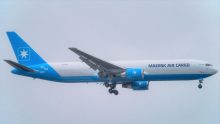 Maersk Air Cargo has parked several leased cargo jets and dialed back flight activity in response to deteriorating demand in the airfreight market. And a planned route between China and the U.S. is on hold, possibly because adding new capacity doesn’t make economic sense. CMA CGM, another ocean carrier that now has an all-cargo airline, recently resumed service between Europe and the U.S. that had been temporarily suspended late last year, demonstrating that carriers respond differently to different regional conditions and corporate priorities, says reports.
Maersk Air Cargo has parked several leased cargo jets and dialed back flight activity in response to deteriorating demand in the airfreight market. And a planned route between China and the U.S. is on hold, possibly because adding new capacity doesn’t make economic sense. CMA CGM, another ocean carrier that now has an all-cargo airline, recently resumed service between Europe and the U.S. that had been temporarily suspended late last year, demonstrating that carriers respond differently to different regional conditions and corporate priorities, says reports.
Only one of the three 767-300 freighters Maersk Air Cargo purchased directly from Boeing last year and outsourced to Miami-based Amerijet to operate between Asia and the U.S. was deployed in revenue service for a period of several weeks, according to flight tracking sites. Maersk acquired the factory-built planes as part of its strategic shift to directly serve importers with a fully integrated supply chain experience rather than simply providing commoditized port-to-port service. Amerijet launched service twice a week between Seoul, South Korea, and Greenville-Spartanburg International Airport in South Carolina at the end of October. The other two aircraft on Amerijet’s air operator certificate were idle at Incheon airport in Seoul, according to data from Flightradar24. One plane arrived from the U.S. on Jan. 4 and has not flown since. The other was inactive for more than two weeks starting Feb. 10, but departed Seoul on March 2 and arrived at GSP on Monday via Anchorage. Maersk officials last fall expressed eagerness about quickly utilizing all the aircraft and expanding their air cargo network in North America, including service between their hub at Chicago-Rockford International Airport and Korea, to create more routing options and flexibility for customers. That route has yet to be turned on and neither has a third weekly frequency to South Carolina, adds reports.
Breaking News
- ‘Kerala, Telangana, UP have seen huge domestic cargo & warehousing growth’
- Saudia Cargo extends WFS handling partnership across Europe & US
- AEI secures DGCA approval for 737-800SF conversion
- Air cargo rates climb as peak season builds, though volatility eases: WorldACD
- IATA Survey shows strong industry momentum behind ONE Record
- Softlink Global unveils next-gen AI & automation capabilities
- Cargo Flash, RwandAir Cargo partner to boost digital efficiency
- GSV, Amazon sign MoU to boost express deliveries across India
- ‘Freighter shortage becomes a critical industry challenge’
- ‘India needs freighters to power Its export surge’
- ‘India needs modern freighters to meet 2030 cargo ambition’
 Cargo Breaking News
Cargo Breaking News


